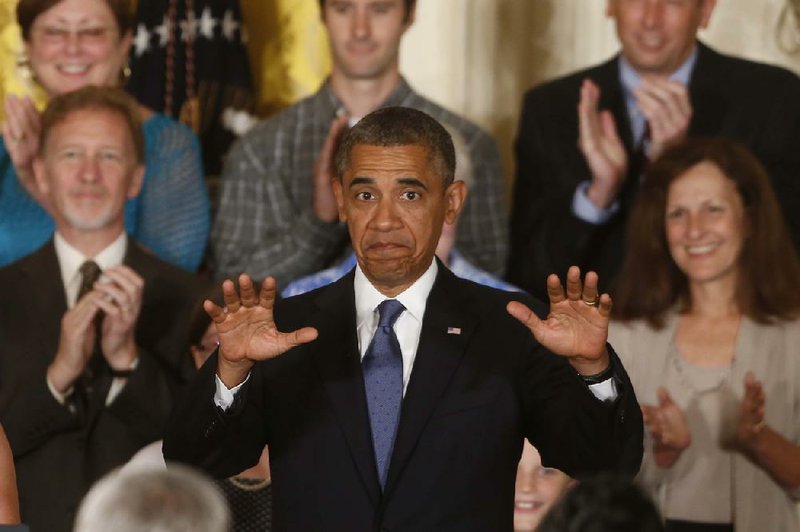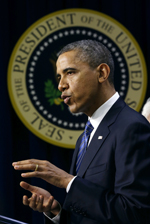WASHINGTON - President Barack Obama said Thursday that thanks to his health-care law, more than 8.5 million Americans were getting rebates this summer from their insurance providers.
Obama was flanked by families who have benefited from a provision in the law that requires health insurers to spend at least 80 percent of the revenue from premiums on medical care rather than on administrative costs. Insurers who fail to meet that benchmark must reimburse customers, a process that began in 2012.
“Last year, millions of Americans opened letters from their insurance companies, but instead of the usual dread that comes with getting a bill, they were pleasantly surprised with a check,” Obama said in a midday ceremony at the White House.
The checks typically amount to no more than a few hundred dollars. But the president, recounting stories of middle-class families on the stage behind him, celebrated these modest checks as an early sign of the tangible benefits of the law.
Obama’s comments marked a return to the health-law debate. He said nothing publicly about the administration’s recent decision to delay for a year a part of the law dealing with employer-provided insurance.
With the Republican-controlled House of Representatives voting yet again this week to repeal the Patient Protection and Affordable Care Act, however, he seized on new statistics that demonstrate the law is driving down premiums in New York, California and several other states.
The Department of Health and Human Services just released a report asserting that, in 11 states and the District of Columbia, proposed health-insurance premiums for 2014 are nearly 20 percent lower than the administration projected.
Monthly rates for “silver” plans will average $321 in those states, less than the $392 average predicted by the Congressional Budget Office, according to the report. The report shows that only one state, Vermont, reported premiums for silver plans higher than the estimate - $400. New Mexico had the cheapest at $226.
The report examines the price of silver plans because they determine the amount of subsidies people will receive when they shop in the exchanges. There will be four levels of coverage available through the exchanges - bronze, silver, gold and platinum. Bronze plans, covering 60 percent of the cost of care, will be the cheapest. Platinum covers 90 percent of care.
“Today’s report shows that the Affordable Care Act is working to increase transparency and competition among health insurance plans and drive premiums down,” Kathleen Sebelius, the secretary of health and human services, said in a statement.
But critics downplayed the importance of the Health and Human services report.
“They’re trying to get the message out that health reform is a good deal,” said Joseph Antos, a health economist at the American Enterprise Institute who advises the Congressional Budget Office. “They’re comparing it not to what people actually pay today, or what people expect to pay, but rather frankly a guess from the Congressional Budget Office from last year that really doesn’t represent a good indicator of whether people are happy with their options or not.”
But White House press secretary Jay Carney countered by citing a report from New York state officials Wednesday that forecast health-insurance premiums will drop about 50 percent on average for consumers who buy new plans through a state-run marketplace created under the health-care law.
“This is in line with what we’ve seen in other states, like California and Oregon,” Carney said. “Competition and transparency in the marketplaces, plus the hard effort by those committed to making the law work, are leading to affordable, new, and better choices for families.”
The health-care law seeks to expand coverage to most of the nation’s 50 million uninsured people. About 7 million people are expected to enroll in exchange plans next year, rising to 25 million by 2018, according to the Congressional Budget Office. The law also encourages states to expand their Medicaid programs for the poor to cover people earning close to poverty-level wages.
Many people who are uninsured probably expect coverage on the exchanges “to be such a good deal that you can’t pass it up,” Antos said. While that should be true for people with extremely low incomes, once you get above about 200 percent of poverty “that’s absolutely not going to be true,” he said.
Thursday’s event in the East Room put the White House back on the offensive on health care after its decision to delay requiring employers with more than 50 employees to offer health insurance or pay a penalty.
More than 94 percent of employers with more than 50 employees already provide health benefits.
The delay was announced after heavy pressure from businesses, which said the law was too complex and cumbersome to implement on time, and it provided critics with fresh ammunition for their claim that the law was putting unfair burdens on individuals and employers.
Most health experts believe that the individual mandate, a portion of the law requiring most Americans to purchase insurance or pay a penalty, is much more critical than the employer mandate in ensuring successful implementation of the Affordable Care Act.
The penalty for individuals - $95 in 2014 - is designed to encourage younger, healthier consumers who have opted out of buying insurance to sign up for coverage next year. These healthy consumers are critical to keeping insurance premiums in check.
The nonpartisan Congressional Budget Office estimates that about 6 million people of various ages will instead pay the penalty in 2014.
The GOP has fought the individual mandate, saying it is unfair to force people to buy insurance if they don’t want it.
Republicans did not let up Thursday, claiming that the benefits extolled by Obama would be more than offset by higher costs. In some cases, they did not even wait for him to speak.
“Even though we expect the president today to tout about $500 million of these types of refunds, what he won’t say is that next year Obamacare will impose a new sales tax on the purchase of health insurance that will cost Americans about $8 billion,” said the Senate Republican leader, Mitch McConnell of Kentucky. “That’s a 16-to-1 ratio.”
In a statement after Obama spoke, House Speaker John Boehner, R-Ohio, said: “The picture the president paints of his health-care law looks nothing like the reality facing struggling American families. They know that the law is turning out to be a train wreck.”
Obama dismissed those arguments as political gamesmanship belied by the statistics from the states. As for the House’s latest vote to repeal the act, he said Republicans were “refighting old battles” rather than confronting the nation’s problems.
“I recognize that there are still a lot of folks - in this town at least - who are rooting for this law to fail,” he said. “Some of them seem to think that this law is about me. It’s not. I already have really good health care.”
For the president’s healthcare law to succeed, almost 40 percent of the 7 million people targeted in the first year need to be young, healthy adults to balance the cost of insuring older people at higher risk of illness.
The cheapest bronze plan available to a 25-year-old in Los Angeles County’s 90021 ZIP code next year will be $152 a month, and subsidies would reduce the premium for many purchasers.
That same person today could buy a basic health plan from Kaiser Permanente for as little as $88, according to the online broker EHealth Inc. That policy doesn’t cover all of the benefits that would be required under the health law, and anyone with a health condition would likely be quoted a higher price or perhaps be denied coverage.
The health law keeps insurers from denying coverage and also requires them to charge the same rates to men and women starting next year. It also prohibits them from charging older people more than three times the cost of the cheapest plan for young adults.
People earning as much as four times higher than the poverty level - meaning an income of about $94,000 for a family of four this year - will be eligible for subsidies that will further reduce the plans’ cost beyond the advertised prices.
Information for this article was contributed by Mark Landler of The New York Times; by Lisa Lerer and Alex Wayne of Bloomberg News; by Noam N. Levey of the Tribune Washington Bureau; and by Nedra Pickler of The Associated Press.
24956500
Front Section, Pages 1 on 07/19/2013

